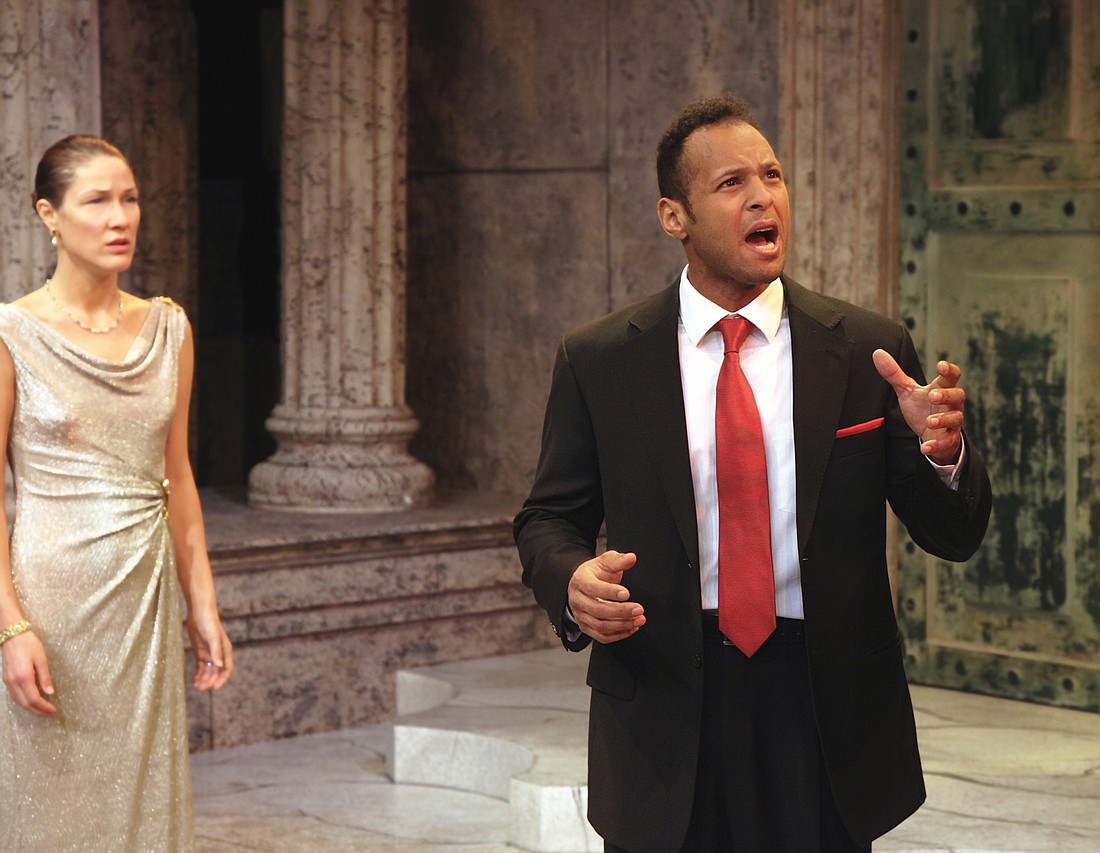- November 25, 2024
-
-
Loading

Loading

Sophocles’ “Oedipus Rex” is living (and reliving) his fate in the Asolo Conservatory’s production. If you’re looking for a feel-good play, keep looking. (Spoiler alert: Oedipus kills his father, marries his mother, and then stabs his own eyes out.) Yeah.
If this play seems weird and alien, that’s because it is. “Oedipus” is light-years away from modern theater for good reason. The mind behind it runs on different software.
Sophocles wasn’t Pinter, Shaw or even Shakespeare. And he didn’t write to entertain or edify. Holy terror was his simple aim. “Oedipus” was designed for religious festivals — basically, revival meetings. A come-to-Apollo experience.
Director Greg Leaming doesn’t soften the play’s ritualistic intent. It’s a modern-dress production, but you forget that in the first five minutes. The characters declaim, spout curses and see visions. There’s no irony, no winking. Gods are real; oracles are real; curses are real. This is their world, and they take this stuff seriously.
The words they speak can be taken seriously because the performance flows from a good translation. Some English renditions of “Oedipus” read like the winners of a bad Shakespeare contest. Stephen Beg and Diskin Clay’s English translation rings true. Good choice.
The action unfolds on Jeffrey Weber’s abstract Grecian set. Not a place in this world, but a realm of the “Twilight Zone” imagination. The actors conveying Sophocles’ ancient dream sway in trance-like motion. (Fine work by motion director Eliza Ladd.) Sofia Gonzalez’s contemporary costumes evoke a self-consistent culture.
It all adds up to a compelling experience. It’s a lot like entering a world of paranoid schizophrenics who all hear the same voices.
And, yes, by modern standards, these people are insane.
The actors deliver compelling performances. Oedipus bellows oratory — but he’s the King of Thebes, and that’s his job. Andrew Hardaway’s characterization evokes true gravitas. His Oedipus is doomed, but he has stature. Lawrence James’ Teiresias strides in sporting Wayfarers, dreadlocks and dashiki as a sage who speaks in the lilting tones of a Ratafarian holy man. That might sound like a gimmick, but it’s a dead-serious performance; the actor makes you feel the prophet’s righteous pain. Olivia Osol is suitably regal (and in deep denial) in the complex role of Jocasta, Oedipus’s mother and wife. Erik Meixelsperger is excellent as Kreon, Oedipus’ brother-in-law. He’s the voice of reason in an irrational world. The Asolo Conservatory’s remaining second-year acting students (Dylan Crow, Matt Kresch, Sara Linares, Katie Sah, Scott Shomaker and Jenny Vallancourt) comprise a powerful chorus — the voice of unreason.
This play has a message, albeit insane.
Oedipus is cursed. Apollo doomed him to kill his father and marry his mother. As punishment, Oedipus pokes out his own eyes, and then wanders the earth as an outcast. Harsh sentence! But the punishment fits the crime, which was predestined by Apollo.
Bad logic. But this play is beyond logic.
Why do bad things happen to good people? Sophocles wrestled with that question. His answer is like the Book of Job without the happy ending. It’s irrational and horrifying. But that’s the answer he finds.
This gutsy production doesn’t flinch from the play’s holy terror. It never feels hokey or overdone. When you’re bringing a nearly 2,500-year-old vision to life, that’s always a risk. But the talents of the Asolo Conservatory make that vision compelling.
If you’re looking for a play to transport you to a different world, look here.